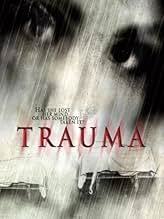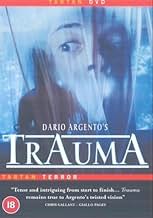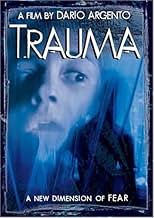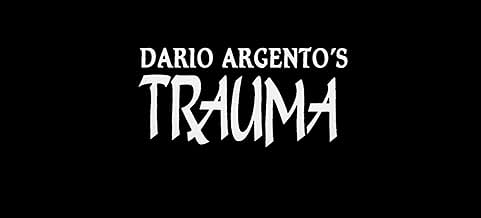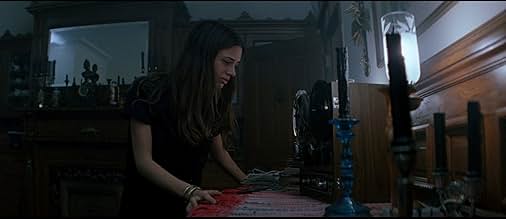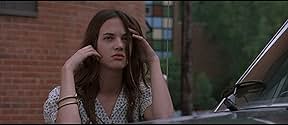NOTE IMDb
5,8/10
8,6 k
MA NOTE
Ajouter une intrigue dans votre langueA young man tries to help a teenage girl find the serial killer who murdered her parents before the killer comes after them.A young man tries to help a teenage girl find the serial killer who murdered her parents before the killer comes after them.A young man tries to help a teenage girl find the serial killer who murdered her parents before the killer comes after them.
- Réalisation
- Scénario
- Casting principal
- Récompenses
- 2 nominations au total
Isabell O'Connor
- Georgia Jackson
- (as Isabell Monk)
Avis à la une
When I picked up TRAUMA at the vid-store, I wasn't really expecting much from it. I'm not a big Argento fan, but I do enjoy Italian horror/cult films. I have to say, I was totally impressed by it! It was a surprisingly great horror-suspense film with great camera work & gore as well. A lot of familiar faces in this film including James Russo, Cristopher Rydell, and Piper Laurie who you might remember from THE FACULTY. Also the lovely Asia Argento who commands the movie like she did in Michele Soavi's THE CHURCH.
Before URBAN LEGEND, I KNOW WHAT YOU DID LAST SUMMER 16, & SCREAM 3000 there was Dario Argento's TRAUMA. And if you enjoyed any of those similar movies you should love this one as well. Except this one is ten times more scarier and realistic with tons of unexpected plot twists that would put all those movies to shame. Its just too bad Argento doesn't make any more horror movies 'round these parts.
Before URBAN LEGEND, I KNOW WHAT YOU DID LAST SUMMER 16, & SCREAM 3000 there was Dario Argento's TRAUMA. And if you enjoyed any of those similar movies you should love this one as well. Except this one is ten times more scarier and realistic with tons of unexpected plot twists that would put all those movies to shame. Its just too bad Argento doesn't make any more horror movies 'round these parts.
A young man (Christopher Rydell) finds an bulimic girl (Asia Argento) who has escaped her parents. When returned to them, a killer with a unique mechanical decapitation device strikes. Soon, the two must find out who the killer is, and what they want.
Released in 1993, "Trauma" has received some flak from Dario Argento fans, who consider it one of his weaker efforts. In a way, I can agree-the movie has several plot holes, the acting is largely hit and miss (Asia is pretty inexperienced here), and it's not as gory and stylish as his other films.
Yet, there's still plenty to recommend in this movie. The movie is Argento's more character and plot oriented films, and it's surprisingly easy to follow. There's also still plenty of Argento's wonderful stylish touches, and while not as gory as his previous movies, there's still some great kills (including a great bit involving an elevator). The score by Pino Donnaggio, while not as good as Argento's past musicians, is still up to task. Finally, the presence of several acting vets (including James Russo, Brad Dourif, Frederic Forrest, and an excellent Piper Laurie) don't hurt at all.
"Trauma" is not Argento's best movie, and certainly pales in comparison to movies like "Deep Red", "Suspiria", and "Inferno." As it stands though, it's an underrated movie, and worth a look, especially if you are an Argento fan.
Released in 1993, "Trauma" has received some flak from Dario Argento fans, who consider it one of his weaker efforts. In a way, I can agree-the movie has several plot holes, the acting is largely hit and miss (Asia is pretty inexperienced here), and it's not as gory and stylish as his other films.
Yet, there's still plenty to recommend in this movie. The movie is Argento's more character and plot oriented films, and it's surprisingly easy to follow. There's also still plenty of Argento's wonderful stylish touches, and while not as gory as his previous movies, there's still some great kills (including a great bit involving an elevator). The score by Pino Donnaggio, while not as good as Argento's past musicians, is still up to task. Finally, the presence of several acting vets (including James Russo, Brad Dourif, Frederic Forrest, and an excellent Piper Laurie) don't hurt at all.
"Trauma" is not Argento's best movie, and certainly pales in comparison to movies like "Deep Red", "Suspiria", and "Inferno." As it stands though, it's an underrated movie, and worth a look, especially if you are an Argento fan.
There are some good stuff here to be sure. Argento-fans tend to rate this way down on the scale and criticize it for being to "americanized". I don't agree. Sure, there is a certain sense of "half-baked Argento" here and there, but I don't find that to be a minus point. If anything, being made in the states, it has more convincing performances and the production values can not be faulted. It's look may seem aneamic if viewed beside "Suspiria" or something more of Argento's more gaudy creations, but I think that this is intentional. Cinematography it absolutely top-notch, conveying a suitably spooky atmosphere to many scenes. The story is fairly straight-forward for an Argento movie, but not standard fare, and if this had been made by a newcomer it would have been hailed as very solid suspenser indeed. The plot twists and turns even if the outcome isn't too much of a surprise. However, one thing really bothers me about "Trauma". The sfx-work by Tom Savini is truly awful. Some scenes, like the one in the elevator-shaft, start creepy enough but are ruined by the effects overall cheesiness (the falling head is only laughable instead of frightening). Shame on you, Savini! Bring on Sergio Stivalletti! Another thing that's not very good is Pino Donaggios score, which he seems to have composed in his sleep. It's not bad, it's just that it seems so routine. Compared to "Deep red" and a few others, this is not Argento at his best. But even Argento at half-speed is better and more interesting than most directors produce within a lifetime.
An anorexic teenager sees her parents murdered and thinks the killer could be coming after her next, so it's up to a struggling addict to keep her safe.
Dario Argento's flair for over the top gory set pieces isn't as noticeable here and everything feels more calm and by the numbers, but every now and then, there's a shot or sequence that feels like old fashioned Argento and those moments are worth watching it for. It's also interesting to see a film of his that appears to use all live audio from the set and that takes place in America. It's jarring at first, but you get used to it.
Dario Argento's flair for over the top gory set pieces isn't as noticeable here and everything feels more calm and by the numbers, but every now and then, there's a shot or sequence that feels like old fashioned Argento and those moments are worth watching it for. It's also interesting to see a film of his that appears to use all live audio from the set and that takes place in America. It's jarring at first, but you get used to it.
TRAUMA
Aspect ratio: 2.39:1 (Technovision)
Sound format: Dolby Stereo
A TV newsroom artist (Mark Rydell) helps a distraught anorexic (Asia Argento) to investigate the death of Argento's mother (Piper Laurie) at the hands of a monstrous serial killer.
Though often cited as the film which signalled a creative downturn in Dario Argento's career, TRAUMA is actually a much better entry than its reputation suggests. The victim of spotty theatrical distribution and horrendous pan-scanned video versions - which reduce the wide Technovision frame to a mere shadow of its former self - the film is an exercise in giallo excess, culminating in one of the finest Grand Guignol set-pieces of this director's long career. Indeed, far from providing evidence of 'creative decline', TRAUMA is actually a fine addition to Argento's filmography, and is ripe for reappraisal.
Despite its American setting, the film is defiantly European in style and execution, employing ultra-wide scope framing, inventive camera-work (including a bizarre shot from the point-of-view of a butterfly!!), ornate narrative structure and eccentric characterizations. It's no wonder some of the supporting American players seem a little disconcerted by the director's unconventional approach (including Frederic Forrest as a doctor sporting an unexplained neck-brace, and James Russo as a typically hard-boiled cop, always one step behind the film's youthful protagonists)! And the script - co-written by Argento and celebrated fantasy author T.E.D. Klein - adheres faithfully to the giallo template, punctuating its convoluted storyline with several grisly murders (though not *that* grisly, considering the involvement of makeup wiz Tom Savini), and a number of compelling set-pieces: The seance which ends in murder; the mental institution where the killer disposes of an important 'clue'; the room full of billowing drapes (an authentic stroke of genius); and the climactic revelation of the killer's motive, which is so utterly horrific, it almost justifies his/her gruesome rampage. The movie ain't called TRAUMA for nothing!
At least two other versions of the film have surfaced in bootleg video form over the years, both of which plug a number of gaping editorial gaps in the official 'director's cut' (note, for instance, the abrupt introduction of Rydell and Asia at the beginning of the film), which indicates either distributor problems or a rushed post-production schedule. This may explain why Pino Donaggio's half-hearted score sounds like it was written and recorded before completion of principal photography and tailored to match the finished product, rather than the other way around. The cast is a typical Argentonian mixed bag: Asia portrays the same joyless harpy she's played in all her collaborations with Argento to date (including THE STENDHAL SYNDROME and THE PHANTOM OF THE OPERA), leaving Rydell to shoulder most of the film's emotional burden as a young man who learns to accept Asia's flaws whilst simultaneously falling in love with her (few) virtues. Frankly, she doesn't deserve him! Laurie makes much of her limited screen time as Asia's domineering mother, while Brad Dourif (the "Lord of the Rings" trilogy) plays a former doctor whose guilty conscience comes back to haunt him in the worst possible way. Watch out for ex-"Falcon Crest" star Laura Johnson in a brief but creepy performance (her final scene is genuinely chilling) as an ambitious TV news anchorwoman who tries to stake her claim on Rydell in no uncertain terms.
Aspect ratio: 2.39:1 (Technovision)
Sound format: Dolby Stereo
A TV newsroom artist (Mark Rydell) helps a distraught anorexic (Asia Argento) to investigate the death of Argento's mother (Piper Laurie) at the hands of a monstrous serial killer.
Though often cited as the film which signalled a creative downturn in Dario Argento's career, TRAUMA is actually a much better entry than its reputation suggests. The victim of spotty theatrical distribution and horrendous pan-scanned video versions - which reduce the wide Technovision frame to a mere shadow of its former self - the film is an exercise in giallo excess, culminating in one of the finest Grand Guignol set-pieces of this director's long career. Indeed, far from providing evidence of 'creative decline', TRAUMA is actually a fine addition to Argento's filmography, and is ripe for reappraisal.
Despite its American setting, the film is defiantly European in style and execution, employing ultra-wide scope framing, inventive camera-work (including a bizarre shot from the point-of-view of a butterfly!!), ornate narrative structure and eccentric characterizations. It's no wonder some of the supporting American players seem a little disconcerted by the director's unconventional approach (including Frederic Forrest as a doctor sporting an unexplained neck-brace, and James Russo as a typically hard-boiled cop, always one step behind the film's youthful protagonists)! And the script - co-written by Argento and celebrated fantasy author T.E.D. Klein - adheres faithfully to the giallo template, punctuating its convoluted storyline with several grisly murders (though not *that* grisly, considering the involvement of makeup wiz Tom Savini), and a number of compelling set-pieces: The seance which ends in murder; the mental institution where the killer disposes of an important 'clue'; the room full of billowing drapes (an authentic stroke of genius); and the climactic revelation of the killer's motive, which is so utterly horrific, it almost justifies his/her gruesome rampage. The movie ain't called TRAUMA for nothing!
At least two other versions of the film have surfaced in bootleg video form over the years, both of which plug a number of gaping editorial gaps in the official 'director's cut' (note, for instance, the abrupt introduction of Rydell and Asia at the beginning of the film), which indicates either distributor problems or a rushed post-production schedule. This may explain why Pino Donaggio's half-hearted score sounds like it was written and recorded before completion of principal photography and tailored to match the finished product, rather than the other way around. The cast is a typical Argentonian mixed bag: Asia portrays the same joyless harpy she's played in all her collaborations with Argento to date (including THE STENDHAL SYNDROME and THE PHANTOM OF THE OPERA), leaving Rydell to shoulder most of the film's emotional burden as a young man who learns to accept Asia's flaws whilst simultaneously falling in love with her (few) virtues. Frankly, she doesn't deserve him! Laurie makes much of her limited screen time as Asia's domineering mother, while Brad Dourif (the "Lord of the Rings" trilogy) plays a former doctor whose guilty conscience comes back to haunt him in the worst possible way. Watch out for ex-"Falcon Crest" star Laura Johnson in a brief but creepy performance (her final scene is genuinely chilling) as an ambitious TV news anchorwoman who tries to stake her claim on Rydell in no uncertain terms.
Le saviez-vous
- AnecdotesThe character played by Asia Argento is inspired by her half-sister Anna (Nicolodi's daughter from a previous marriage) who actually suffered from anorexia. Anna died in a scooter accident in 1994 shortly after the film's release, but she is seen in the actual movie during the closing credits dancing in the balcony.
- GaffesThe newscaster says that Dr. Judd died on impact at the scene of the accident, but he actually delivers some last words before succumbing.
- Versions alternativesA special uncut version reportedly available on video features 7 minutes of footage omitted from foreign prints including:
- a new introduction of the Aura and David characters: David (Chris Rydell) drives Grace (Laura Johnson) to the airport and sees Aura (Asia Argento) being beaten by a man whose plane ticket she tried to steal;
- a new scene features Grace visiting David at the TV station and asking him about Aura; David invites Grace to his house and then calls Aura at home to ask her if she needs any food; Aura lies to him and tells she's already eaten;
- Aura visits a market and is spotted by Dr. Jarvis (Frederic Forrest), who tries to catch her;
- After David and Aura escape from the Marigold, she tells him she's taken a little souvenir from Nurse Volkmann's purse; another new shot shows the Marigold's owner talking to the police;
- David checks into a hotel after following Linda Quirk's car and asks for a room overlooking the parking lot;
- David asks for information about Dr. Lloyd in a saloon;
- After David calls Grace and asks her for prescription forms, she meets and confronts him, trying to make him face the fact that he's become a junkie;
- The death scenes of Linda Quick and of the killer are more graphically explicit (the wire is seen cutting through Linda's neck).
- ConnexionsFeatured in Dario Argento: Il mio cinema (1999)
- Bandes originalesRuby Rain
Sung by Laura Evan
Lyrics by Paolo Steffan
Music by Pino Donaggio
Arranged and Performed by Paolo Steffan
Meilleurs choix
Connectez-vous pour évaluer et suivre la liste de favoris afin de recevoir des recommandations personnalisées
Détails
Box-office
- Budget
- 7 000 000 $US (estimé)
- Montant brut mondial
- 475 $US
- Durée1 heure 46 minutes
- Couleur
- Mixage
- Rapport de forme
- 2.35 : 1
Contribuer à cette page
Suggérer une modification ou ajouter du contenu manquant



